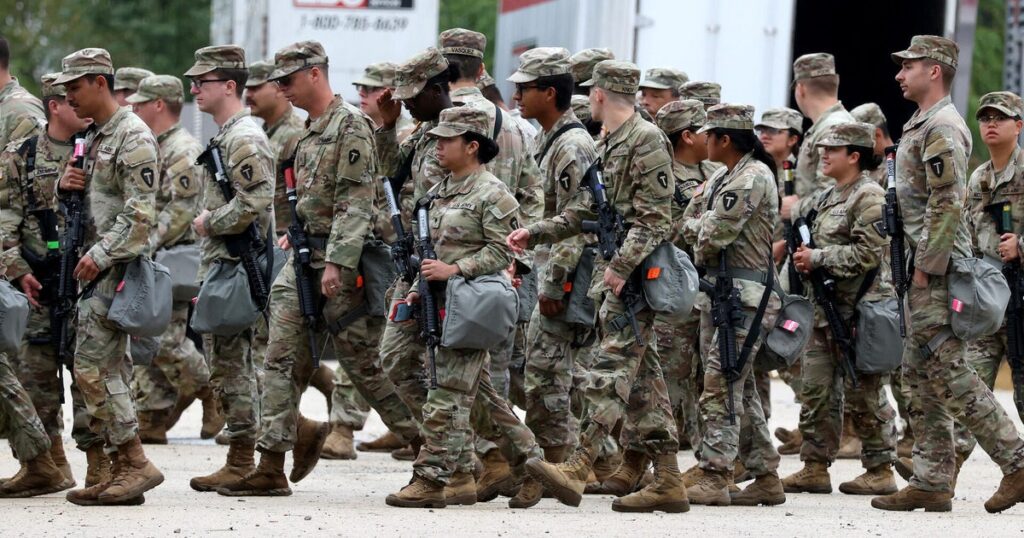Approximately 500 National Guard soldiers from Texas and Illinois have been deployed in the Chicago area and mobilized to protect federal agents and facilities amid a legal battle over their deployment.
According to the U.S. Northern Command at the Department of Defense, approximately 200 soldiers from the Texas National Guard and 300 soldiers from the Illinois National Guard have been “employed in the greater Chicago area.” Their mobilization will last for a period of at least 60 days.
“These forces will protect U.S. Immigration and Customs Enforcement and other U.S. government personnel who are performing federal functions, including the enforcement of federal law, and to protect federal property,” Northern Command said in a statement.
The troops have been stationed at the U.S. Army Reserve Center in southwest suburban Elwood, where new fencing has been installed since the Texas guard members first arrived on Tuesday. Crews also have installed privacy screens along the interior of the existing fence line.
Several trailers have been set up at the facility as temporary living quarters. Several soldiers were seen moving in with bags of belongings on Tuesday; some holding rifles and carrying folding chairs, possibly for meetings or other trainings.
Northern Command said as part of their duties to protect federal agents and facilities, the troops would be assigned to establish security perimeters, perform crowd control, and use de-escalation tactics. While soldiers would be allowed to temporarily detain people to prevent an assault or interference with federal agents, Northern Command said they will not be arresting protesters.
There were a handful of demonstrations outside the facility on Wednesday; a couple to protest against the arrival of Texas guard members, and a couple more to support them.
Illinois state leaders said they only got word late Monday night that the 200 Texas National Guard troops would be stationed at the Elwood base starting Tuesday.
Retired U.S. Army Maj. Gen. Richard Hayes was the highest-ranking member of the Illinois National Guard. In his 30-plus-year career, he said he’s never seen a National Guard from a different state federalized and then sent to another state.
“This is novel. It doesn’t mean it’s necessarily illegal, it’s just different,” he said. “As far as the soldiers are concerned, the Illinois National Guard, even the Texas National Guard, they don’t get a say in whether they go or not go. It’s not a political organization, they’re just here to do what they’re being asked to do.”
There has been little movement in or out of the training facility since the troops arrived, and CBS News Chicago legal analyst Irv Miller said he’s not surprised.
It remains in question whether the troops will be sent out on protection details, since the state of Illinois and city of Chicago have filed a lawsuit challenging the Trump administration’s deployment of the National Guard. Gov. JB Pritzker and Mayor Brandon Johnson have argued there is no crisis requiring the troops’ presence in the Chicago area.
Federal judge April Perry scheduled a hearing for Thursday for arguments on a request for a temporary restraining order blocking the troop deployment. Perry declined to immediately issue that restraining order on Monday when the lawsuit was filed to give the federal government time to file briefs, which it did, minutes before the 11:59 p.m. CDT Wednesday deadline she set.
In the 59-page filing, the government argued that President Trump has the legal authority to deploy the troops and that state objections should not block the operation. The federal attorneys also argued that courts should be “highly deferential” when reviewing a president’s judgment in such matters in light of the authority they say the executive branch is given by the Constitution and statutes.
Miller said it’s likely leaders are waiting for the judge’s decision before making any moves.
“Oh, absolutely. I mean, the judge didn’t explicitly state that they couldn’t come into the city, but I think if you read between the lines as to what she was saying, that it probably would be a good idea if everybody waited until she made the decision on Thursday to decide what they’re going to actually do,” Miller said.
Miller said he expects the judge to grant the temporary restraining order prohibiting the deployment for now, but any decision will likely be appealed to a higher court.
A federal judge in Oregon has blocked the Trump administration from deploying any National Guard units to Portland. That judge has ruled the relatively small protests outside Portland’s immigration processing facility didn’t justify the use of federalized forces and allowing the deployment could harm Oregon’s state sovereignty.
Since that ruling, Oregon Gov. Tina Kotek has called on U.S. Northern Command to demobilize the 200 Oregon National Guard troops and 200 California National Guard troops that the Trump administration had mobilized for Portland.
Mr. Trump has suggested, regardless of what happens in court, he might invoke the Insurrection Act “if it was necessary” to deploy troops to Portland and Chicago.
“If people were being killed and courts were holding us up, or governors or mayors were holding us up, sure I’d do that. I mean, I want to make sure that people aren’t killed,” he said earlier this week.
U.S. Sen. Dick Durbin said the president invoking the Insurrection Act to justify a troop deployment “would be terrible.”
“It would be illegal and unconstitutional, because there is no basis in law for his invasion with these troops from Texas into the state of Illinois. He is not making life any better for our state, and he’s not making it any safer,” Durbin said.
Nicole Sganga and
contributed to this report.
https://www.cbsnews.com/news/texas-national-guard-members-deploy-chicago-area/


